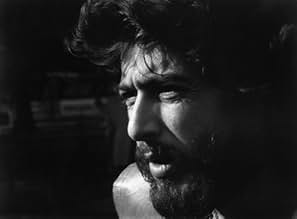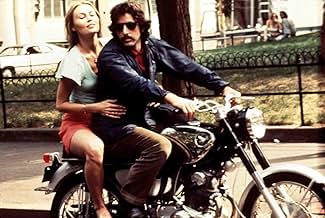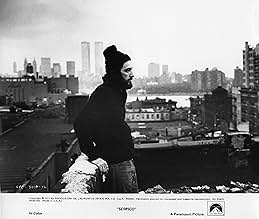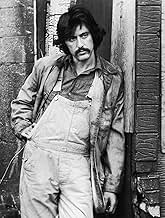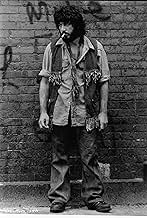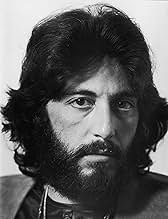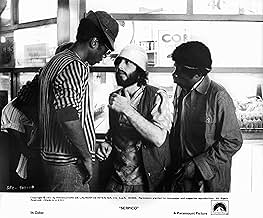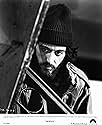Serpico
- 1973
- Tous publics
- 2h 10min
An honest New York cop named Frank Serpico blows the whistle on rampant corruption in the force only to have his comrades turn against him.An honest New York cop named Frank Serpico blows the whistle on rampant corruption in the force only to have his comrades turn against him.An honest New York cop named Frank Serpico blows the whistle on rampant corruption in the force only to have his comrades turn against him.
- Réalisation
- Scénario
- Casting principal
- Nommé pour 2 Oscars
- 8 victoires et 13 nominations au total
Barbara Eda-Young
- Laurie
- (as Barbara eda-Young)
Edward Grover
- Lombardo
- (as Ed Grover)
Albert Henderson
- Peluce
- (as Al Henderson)
Joseph Bova
- Potts
- (as Joe Bova)
Woodie King Jr.
- Larry
- (as Woodie King)
Avis à la une
Frank Serpico begins his career with the NYPD as an idealistic rookie who believes in the moral value of policing. He has a simple and old-fashioned ethical code, an outlook which used to be known as honesty. What he finds is a moral sewer, five boroughs wide, in which almost every cop is on the take. The police are just another gang of hoodlums, but with more guns than the bad guys. Even basically decent cops go along with the kickback culture, because a locker-room psychology prevails in which values have become perverted. Squad loyalty is now a criminal conspiracy of silence. Detectives do not hesitate to shake-down hoods who are slow to pay. To Frank Serpico, this is simply wrong. He wants no part of it. And so his long agony begins.
Both responding to and helping to shape the mood of its time, a weary cynicism towards authority, "Serpico" arrived on the screen just as Watergate built to its climax. Americans could no longer regard their institutions as gleaming examples to mankind of optimism and good government. The film begins gloomily with Serpico badly wounded, having been shot in the face. We hear police and ambulance sirens fading, symbolically representing the life-force ebbing from Frank, and the withering of American dreams.
This first-class film is a triumph, and one that could easily have misfired. Had the crooked cops been depicted as mere thugs, then Serpico himself would have been an archetype, just another two-dimensional crusader. What gives the film its psychological richness is the realisation that the dishonest cops are NICE. These are affable, reasonable men who want to like Serpico and want to welcome him onto the team. The camaraderie is seductive and it's difficult for Frank to hold out against it. He is besieged by self-doubt, wondering if he is just a one-man awkward squad, or worse - a prima donna, sacrificing personal relationships on the altar of his own ego.
Again, the easy (but disastrous) course would have been to give Frank some big heroic speeches, allowing him to inveigh against corruption. The film chooses instead to go for psychological truth, and this is what makes the project outstanding. Appalled, afraid and despairing of ever changing anything, Frank withdraws into himself. He becomes the spectre at the feast, the silent rebuke, the muted but ever-present conscience of his colleagues.
Though Frank rejects the golden shield which is eventually offered, we feel that the system still means something. There are still some honest cops, and even after all these vicissitudes, the United States is still a nation of laws. Lumet's profoundly liberal and optimistic view of America ultimately shines through, but the final mood is one of quiet resignation rather than triumphalism. Right can prevail over wrong, but a price has to be paid. Serpico wins his titanic struggle, but he is diminished and saddened as a man.
The film contains some marvellous technical things. In the opening minutes, the action cuts between Frank as he is now (wounded, broken and alone) and as he started out (the clean-cut, idealistic rookie). These transitions are seamless, and the narrative logic is smooth and natural. We see Frank's first moment of disenchantment in a cafeteria when it dawns on him that cops get free handouts of food, but they have to take whatever comes. This first bewilderment develops until we see the gulf open up between Frank and the dishonest cops, the ones who take the money but also take the self-loathing.
The terrible stress to which Frank is subjected is depicted with skill. The police department has a huge institutional inclination to protect its own, and this vast weight is brought to bear on Serpico. Equally, the pressure is relieved cleverly at appropriate points in the narrative. Frank's 'collar' of Rudi Casaro reaches an explosive climax as this all too human guy reaches breaking-point. On the other hand, the romantic story-telling interlude with Laurie and Serpico's undercover cameo as an orthodox rabbi break the tension and vary the pace beautifully.
The second-unit work is of a uniformly high standard. We are shown atmospheric New York streetscapes with grubby brownstones and the massive, overbearing masonry of the Brooklyn Bridge, in knowing homage to the films noirs of twenty years earlier. The symbols are powerful. This city, and this police department, are too colossal for one man to stand against them. Practice sessions in the police firing gallery intelligently reinforce the film's undercurrent of foreboding. Paper targets obscure the gunmen's faces, suggesting a monolithic force united against Frank, then come hurtling towards him on pulleys, signifying the fate which is rushing to meet him.
Mikis (Zorba the Greek) Theodorakis has provided a classy score. I particularly liked the jazzy, minor-key horn passage.
Pacino puts in another of the towering performances which have distinguished him as the profoundest acting talent of his era. He is simply wonderful. Barbara Eda-Young gives top-notch support as Laurie, the genuinely loving partner who is destroyed by her man's seeming eagerness for martyrdom in rejection of domestic happiness. If ever an actor exuded confidence it's Tony Roberts, and he is ideally cast as Bob Blair, Serpico's well-connected ally. Though he can open City Hall doors, he can't actually help Frank at all. Nobody can. Christ-like, Frank understands that it is ordained - he must go to the hill alone.
Both responding to and helping to shape the mood of its time, a weary cynicism towards authority, "Serpico" arrived on the screen just as Watergate built to its climax. Americans could no longer regard their institutions as gleaming examples to mankind of optimism and good government. The film begins gloomily with Serpico badly wounded, having been shot in the face. We hear police and ambulance sirens fading, symbolically representing the life-force ebbing from Frank, and the withering of American dreams.
This first-class film is a triumph, and one that could easily have misfired. Had the crooked cops been depicted as mere thugs, then Serpico himself would have been an archetype, just another two-dimensional crusader. What gives the film its psychological richness is the realisation that the dishonest cops are NICE. These are affable, reasonable men who want to like Serpico and want to welcome him onto the team. The camaraderie is seductive and it's difficult for Frank to hold out against it. He is besieged by self-doubt, wondering if he is just a one-man awkward squad, or worse - a prima donna, sacrificing personal relationships on the altar of his own ego.
Again, the easy (but disastrous) course would have been to give Frank some big heroic speeches, allowing him to inveigh against corruption. The film chooses instead to go for psychological truth, and this is what makes the project outstanding. Appalled, afraid and despairing of ever changing anything, Frank withdraws into himself. He becomes the spectre at the feast, the silent rebuke, the muted but ever-present conscience of his colleagues.
Though Frank rejects the golden shield which is eventually offered, we feel that the system still means something. There are still some honest cops, and even after all these vicissitudes, the United States is still a nation of laws. Lumet's profoundly liberal and optimistic view of America ultimately shines through, but the final mood is one of quiet resignation rather than triumphalism. Right can prevail over wrong, but a price has to be paid. Serpico wins his titanic struggle, but he is diminished and saddened as a man.
The film contains some marvellous technical things. In the opening minutes, the action cuts between Frank as he is now (wounded, broken and alone) and as he started out (the clean-cut, idealistic rookie). These transitions are seamless, and the narrative logic is smooth and natural. We see Frank's first moment of disenchantment in a cafeteria when it dawns on him that cops get free handouts of food, but they have to take whatever comes. This first bewilderment develops until we see the gulf open up between Frank and the dishonest cops, the ones who take the money but also take the self-loathing.
The terrible stress to which Frank is subjected is depicted with skill. The police department has a huge institutional inclination to protect its own, and this vast weight is brought to bear on Serpico. Equally, the pressure is relieved cleverly at appropriate points in the narrative. Frank's 'collar' of Rudi Casaro reaches an explosive climax as this all too human guy reaches breaking-point. On the other hand, the romantic story-telling interlude with Laurie and Serpico's undercover cameo as an orthodox rabbi break the tension and vary the pace beautifully.
The second-unit work is of a uniformly high standard. We are shown atmospheric New York streetscapes with grubby brownstones and the massive, overbearing masonry of the Brooklyn Bridge, in knowing homage to the films noirs of twenty years earlier. The symbols are powerful. This city, and this police department, are too colossal for one man to stand against them. Practice sessions in the police firing gallery intelligently reinforce the film's undercurrent of foreboding. Paper targets obscure the gunmen's faces, suggesting a monolithic force united against Frank, then come hurtling towards him on pulleys, signifying the fate which is rushing to meet him.
Mikis (Zorba the Greek) Theodorakis has provided a classy score. I particularly liked the jazzy, minor-key horn passage.
Pacino puts in another of the towering performances which have distinguished him as the profoundest acting talent of his era. He is simply wonderful. Barbara Eda-Young gives top-notch support as Laurie, the genuinely loving partner who is destroyed by her man's seeming eagerness for martyrdom in rejection of domestic happiness. If ever an actor exuded confidence it's Tony Roberts, and he is ideally cast as Bob Blair, Serpico's well-connected ally. Though he can open City Hall doors, he can't actually help Frank at all. Nobody can. Christ-like, Frank understands that it is ordained - he must go to the hill alone.
The first real power-house performance by Pacino, thirty years down the line still one of his finest
Sidney Lumet proved himself to be a highly competent and effective director/storyteller for the true story of New York Officer Frank Serpico, who became famous after appearing to testify before the NAPA Commission about payoffs and corruption in the Police Department. At the time, it was unheard of, and it gained Peter Maars attention to write the book, which thus got transferred to the screen as so. But what makes Serpico such a riveting and eye catching picture today are the little things about it, little details in specific scenes and locations that help ring Serpico's emotions far more than true- it's just there. Even more amazing on the part of the actual filming of the movie is that it was at the time filmed backwards (started with the beard, then the mustache, then clean-shaven).
Al Pacino, right off of the first part of the Godfather trilogy, took this role with all the fire and compassion that he had in him. He sees in Serpico not just an honest cop wanting some balance and honor in his work, yet also a man, who can get as joyful and humorous as he can act subtle, furious, and thoughtful. This will always remain one of his stand-out roles after all the Scarfaces and Scent of a Woman pictures he can do because he, as well as Lumet, know how to approach such a saga. Plenty of great, compelling set pieces, and even sweet ones (like when he first buys the sheepdog as a puppy). A+
Al Pacino, right off of the first part of the Godfather trilogy, took this role with all the fire and compassion that he had in him. He sees in Serpico not just an honest cop wanting some balance and honor in his work, yet also a man, who can get as joyful and humorous as he can act subtle, furious, and thoughtful. This will always remain one of his stand-out roles after all the Scarfaces and Scent of a Woman pictures he can do because he, as well as Lumet, know how to approach such a saga. Plenty of great, compelling set pieces, and even sweet ones (like when he first buys the sheepdog as a puppy). A+
10ed56
Serpico, directed by Sydney Lumet at the peak of his career, and also launched Al Pacino into a star status. The story follows Frank Serpico, an ambitious and idealist policeman from his first days at the police force as he is exposed to a routine police corruption and to his final days in the force as he invests all his energy in fighting these corruptions. Al Pacino's Performance as Serpico is one of the best in his career, he plays it so cool and professional that it's easy to forget that back in 1973 he was still at the beginning of his career. He makes character of Frank Serpico unforgettable. The film itself is very credible and honest with no clichés that are often appear in this kind of genre. New York has got a terrific look here. every place in this film whether it's bars or shops or buildings is memorable. Overall this makes for a very unique cinematic experience and shouldn't be missed by any movie fan. Well Recommended. 10/10
Sidney Lumet is a director who captures something crucial in city based dramas surrounding legal and political affairs; with films like '12 angry men', 'the verdict', 'nightfalls on Manhattan' and 'Q & A' he shows an excellent grasp of the power plays in civic politics. In 'Serpico' he uses an excellent script to tell the story of an unorthodox character in Frank Serpico, a hippie in a time when most cops were square as a doorway but whose honesty when faced with police corruption marks him out as a man of remarkable character. Unflinching in its depiction of Serpico, the film portrays warts and all, over the period in which he refuses to take money and shows his extraordinary political vindication at an official investigation into NYPD corruption. The story of civic corruption is cogent in any time, one only has to look at great empires like Rome to understand how much corruption plays a part in the shaping of so called civilizations; where the very foundation stones have bodies, so to speak, buried under them or even within them. This film is both informative and honest in much the way 'All the Presidents Men' would be in the following year. Winning Al Pacino a deserved Oscar nomination in the years between the Godfather's Part I and II; it demonstrates the range of an actor who would go on to portray a character in Michael Corleone soon afterwards who is the very nemisis of the character in Serpico. In Serpico there is a dramadocumentary that calls to mind Shakespeares history plays in its depiction of a classical situation of a man ostracized and driven by noble sentiments to embody something of the civic value one expects of servants of the public trust. Brilliant film. 10 out of 10.
(1973)
Sidney Lumet's Serpico is based on such a compelling story, and is told so well, you really can't not like it. Al Pacino dominates, and he is in every scene. This means the movie is based almost literally on what Frank Serpico saw and did as a moral and unshakeable cop in New York just before the film was made.
It's filmed with gritty realism but without sensationalism, though you might say a little artlessly, too, as if Lumet just wants to get the job done and not get in the way. In fact, Lumet wasn't involved in pre-production, called in just a filming was to start, so there might be a disconnect there. The support cast--mostly other cops plus two sometimes convincing girlfriends--is very good, though very few of them are developed at all.
So it's a very good film with a great story--a plain enough summary of a movie that won't let you go. But wait, you do have to let Pacino take a bow for another absorbing, intense performance. It's his movie. And Frank Serpico, who just saw it for the first time last year, after carefully avoiding it for almost forty years. A great article of the real Serpico from January 2010 can be found by typing "Serpico on Serpico" in google, and look for the New York Times article, worth the fast read!
Sidney Lumet's Serpico is based on such a compelling story, and is told so well, you really can't not like it. Al Pacino dominates, and he is in every scene. This means the movie is based almost literally on what Frank Serpico saw and did as a moral and unshakeable cop in New York just before the film was made.
It's filmed with gritty realism but without sensationalism, though you might say a little artlessly, too, as if Lumet just wants to get the job done and not get in the way. In fact, Lumet wasn't involved in pre-production, called in just a filming was to start, so there might be a disconnect there. The support cast--mostly other cops plus two sometimes convincing girlfriends--is very good, though very few of them are developed at all.
So it's a very good film with a great story--a plain enough summary of a movie that won't let you go. But wait, you do have to let Pacino take a bow for another absorbing, intense performance. It's his movie. And Frank Serpico, who just saw it for the first time last year, after carefully avoiding it for almost forty years. A great article of the real Serpico from January 2010 can be found by typing "Serpico on Serpico" in google, and look for the New York Times article, worth the fast read!
Le saviez-vous
- GaffesThe prison "chain gang" being led into the wagon at the beginning has male and female prisoners on the same "chain," and both sexes are transported in the same wagon. The NYPD absolutely forbade that then, and still does.
- Citations
Frank Serpico: The reality is that we do not wash our own laundry--it just gets dirtier.
- Versions alternativesThere is one Australian VHS version released through RCA Columbia Pictures Hoyts Home Video in the 1980s which had all profanity overdubbed with tamer language, as well as some scenes of sexuality/nudity. Subsequent releases on DVD are uncensored.
- ConnexionsEdited into The Kid Stays in the Picture (2002)
Meilleurs choix
Connectez-vous pour évaluer et suivre la liste de favoris afin de recevoir des recommandations personnalisées
- How long is Serpico?Alimenté par Alexa
Détails
- Date de sortie
- Pays d’origine
- Site officiel
- Langues
- Aussi connu sous le nom de
- Serpiko
- Lieux de tournage
- Lewisohn Stadium, Amsterdam Avenue, Manhattan, Ville de New York, New York, États-Unis(Meeting Scene with Bob Blair)
- Sociétés de production
- Voir plus de crédits d'entreprise sur IMDbPro
Box-office
- Budget
- 3 000 000 $US (estimé)
- Montant brut aux États-Unis et au Canada
- 29 800 000 $US
- Montant brut mondial
- 29 858 644 $US
Contribuer à cette page
Suggérer une modification ou ajouter du contenu manquant




